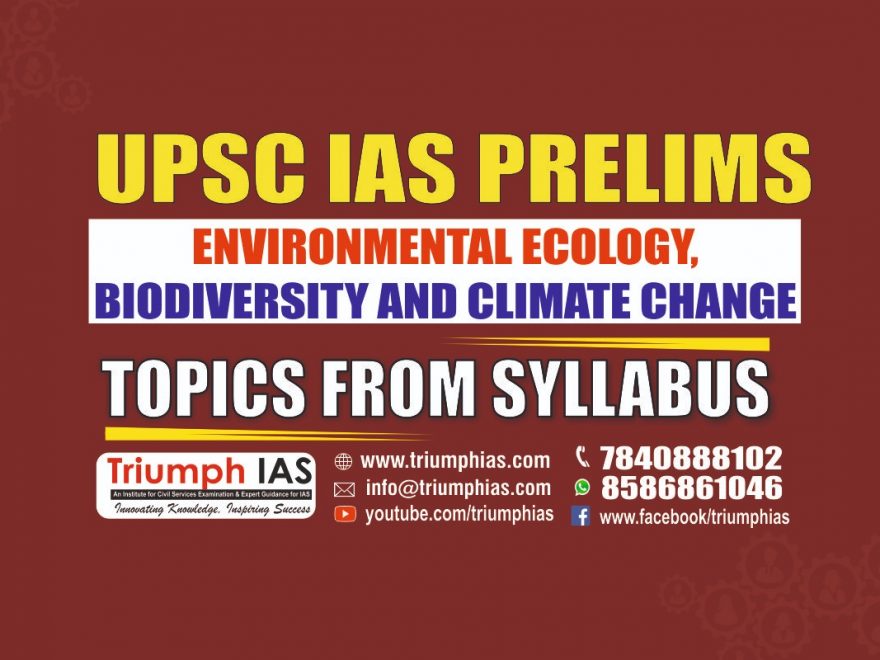Relevance: Prelims/Mains: G.S paper III: Environment
Context:
• Since 1974, World Environment Day has been celebrated every year on June 5 is known as the most renowned day for environmental action.
• It has been engaging over 190 governments, thousands of businesses, celebrities and citizens to focus their efforts on pressing environmental issues.
Highlights about the theme:
• For 2020 the theme is biodiversity — it’s time for nature.
• This is an issue that is both urgent and existential.
• The last decade has made the consequences of our broken relationship with nature more evident than ever before.
• Rapidly changing climate, bushfires, melting glaciers, increasing intensity and frequency of floods and drought; and now, locust attacks and the global Covid-19 pandemic, act as a reminder that human health is linked to the planet’s health.

• The air we breathe, the water we drink, the food we eat, the climate that makes our planet inhabitable is all made available to us by the services that nature and biodiversity perform.
• The eight million species on our planet — from plants to bacteria and animals to fungi — and the ecosystems that house them, and the genetic diversity among them, is what describes biodiversity.
• Biodiversity may be seen as an intricate web of life, in which every part is interdependent. When one component is changed or removed, the entire system is affected and this produces negative consequences.
State of the planet:
• Each year, marine plants produce more than half of our atmosphere’s oxygen.
• A mature tree cleans the air by absorbing 22 kg of carbon dioxide and releasing oxygen in return.
• Each year, pollinators like bees and bats help three-fourth the world’s flowering plants and approximately 35 per cent of the world’s food crops reproduce.
• Today, humans extract more from the Earth than ever before (60 billion tonnes of renewable and non-renewable resources); world population has doubled over 50 years and the per-person consumption of materials up by 15 per cent since 1980.
• Over the last three decades, global extraction of biomass, fossil fuel, minerals and metals rose by 80 per cent, and fishing now covers over half of the world’s ocean.
• This World Environment Day calls on each of us to collectively recognise the interdependence of all life on Earth. It calls upon our collective conscience to be guided by the shared misery caused by this global pandemic and recognise the fragile linkages that human health and existence has with nature.
India and the environment:
• Maharashtra has had to brace itself for the first cyclone in 126 years.
• With the destruction caused by Cyclone Amphan in West Bengal and Orissa, and while the 300 million marginalised people have been suffering unimaginable chaos and suffering caused by Covid-19.
• The starkness of the economic and social insecurity we are faced with has never been more apparent.
Concern for India:
• India is a biodiversity hotspot, a big reason to celebrate our flora and fauna and wide vegetation types. And while our population of 1.3 billion people fights for space on 7 per cent of the world’s land, we must continue to find ways to co-exist with nature.
• Governments must ensure we protect all remaining wild spaces, implement efficient systems of waste management, and adopt a circular economy.
• Ensuring a strong environmental impact assessment, implementation of all environmental guidelines and norms across sectors, building of green infrastructure and support to green enterprises is imperative.
• The private sector needs to account for the environment in supply chains and financing, and adopt green measures. As individuals, we need to rethink what we buy and use and manage our consumption of all resources responsibly.
• As youth, we must become committed gatekeepers of a green future. The quality of our lives and the survival of our population is dependent on these actions.
• As we work to build back our economy, let us not forget the cost of losing our fragile ecosystems that provide us good health, clean air, water, and food?
Conclusion:
• Economic growth can no longer be achieved at the cost of ecological imbalance.
• Well-balanced ecosystems rich in biodiversity are fundamental to human existence, health, peace, and progress.
• It’s time to wake up. To take notice. This World Environment Day, it’s time for nature.
For more such notes, Articles, News & Views Join our Telegram Channel.
Click the link below to see the details about the UPSC –Civils courses offered by Triumph IAS. https://triumphias.com/pages-all-courses.php

